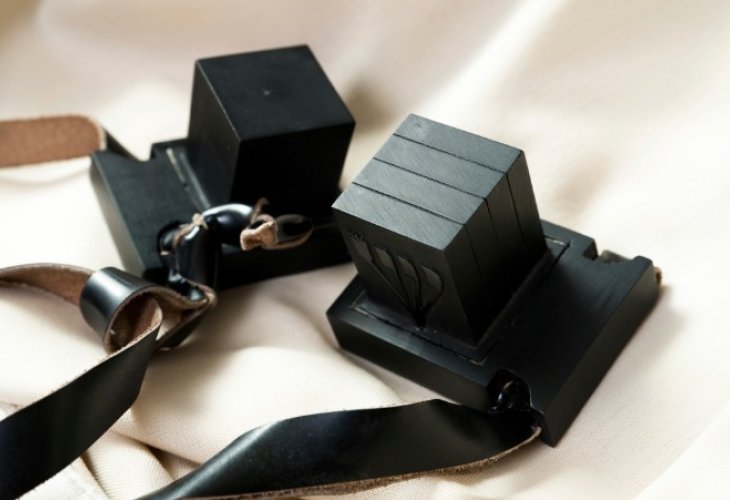Personal Stories
Bar Mitzvah at 78: A Holocaust Survivor's Journey Comes Full Circle
After 65 years, Aryeh Gitzin finally celebrates his Bar Mitzvah together with his grandson, in a moment of healing and hope
- Efrat Cohen
- |Updated

Better late than never. At age 78, Aryeh Gitzin stood at the Torah for the very first time, celebrating the Bar Mitzvah he never had. Sixty-five years after the traditional age of 13, he finally marked this special milestone side by side with his grandson.
Aryeh is a Holocaust survivor. As a boy, the chance to celebrate his Bar Mitzvah was taken from him. Last Thursday, he was finally called up to the Torah, and as he described it, “I was trembling throughout my body. In that moment, I thought of my parents and everything came flooding back to me.”
Aryeh was born in the city of Iași, Romania, the youngest of eleven children. His early childhood was happy, filled with warmth and family. But when he was just two years old, his life was torn apart. His parents, Maika and Yosef, were murdered by the Nazis. In an instant, he and his siblings became orphans, struggling to survive.
Along with two of his sisters, ages 10 and 12, Aryeh fled to Russia. After five years of wandering and hardship, the three returned to Romania and were placed in a children’s home run by the socialist youth movement, Hashomer Hatzair. Later, they were moved to a special orphanage in Holland for 500 Jewish children who had survived the war.
In 1948, Aryeh was almost nine years old when he and his sisters immigrated to Israel on a ship called the Negev. But the journey didn’t end there. Upon arrival, the siblings were separated. Aryeh and one sister were sent to Kibbutz Beit Zera in the Jordan Valley, and the other sister to a different kibbutz.
Of all the painful moments in their lives, Aryeh said that separation was one of the most traumatic. “Even after everything we had been through,” he said, “that was the hardest day of all.”
In the kibbutz, the trauma took a different shape. It was not the physical horror of war, but a spiritual loss. Aryeh came from a deeply religious home. His father had been a chazzan (cantor), and his parents had already bought him tefillin, the small black boxes with Torah passages that Jewish boys begin to wear at Bar Mitzvah age.
But in the secular kibbutz, Aryeh's Jewish roots were pushed away. He calls it a second Holocaust, a spiritual one. Despite surviving the Nazis, he was raised in an environment where the spark of Judaism was nearly extinguished.
Today, Aryeh still lives in Kibbutz Beit Zera. Over the years, he reunited with his siblings, married Devorah, a fellow kibbutz member, and built a family of his own.
But something was always missing. “As a child,” he said, “they never celebrated my birthday. And certainly not a Bar Mitzvah. It simply wasn’t done in our kibbutz.”
Recently, Aryeh’s grandson, Yarden, began preparing for his own Bar Mitzvah. Aryeh followed the process closely. He attended Torah reading lessons and got to know the teacher, Rabbi Pitzi Beloi. They formed a warm connection, and as they spoke more, Aryeh opened up.
He shared his story, the pain of losing his parents, his escape from Romania, the religious home he came from, and how he had never been given the chance to celebrate his own Bar Mitzvah.
Rabbi Beloi, the son of Holocaust survivors himself, had heard similar stories before, older people in the Jordan Valley who felt the loss of this missed milestone. The rabbi wanted to suggest something to Aryeh, but worried it might come off as pushy. Finally, he gently proposed: Why not celebrate your Bar Mitzvah now, together with your grandson?
Aryeh was deeply moved and accepted with joy.
And so, last Thursday, something long overdue finally took place. At the synagogue in Kibbutz Afikim, where the children of Beit Zera pray, Aryeh stood beside Yarden. His grandson was called to the Torah first. Then, Aryeh, his voice shaking with emotion, was called up.
“I was trembling,” he said. “I thought of my parents. I love to sing, and I felt that something from my father’s voice, as a cantor, was alive in me. It was in my soul.”
Rabbi Beloi, too, was moved. “Aryeh was truly happy,” he said. “It touched me deeply to know I was able to help fill this space in someone’s heart, something he had carried with him for so many years.”

